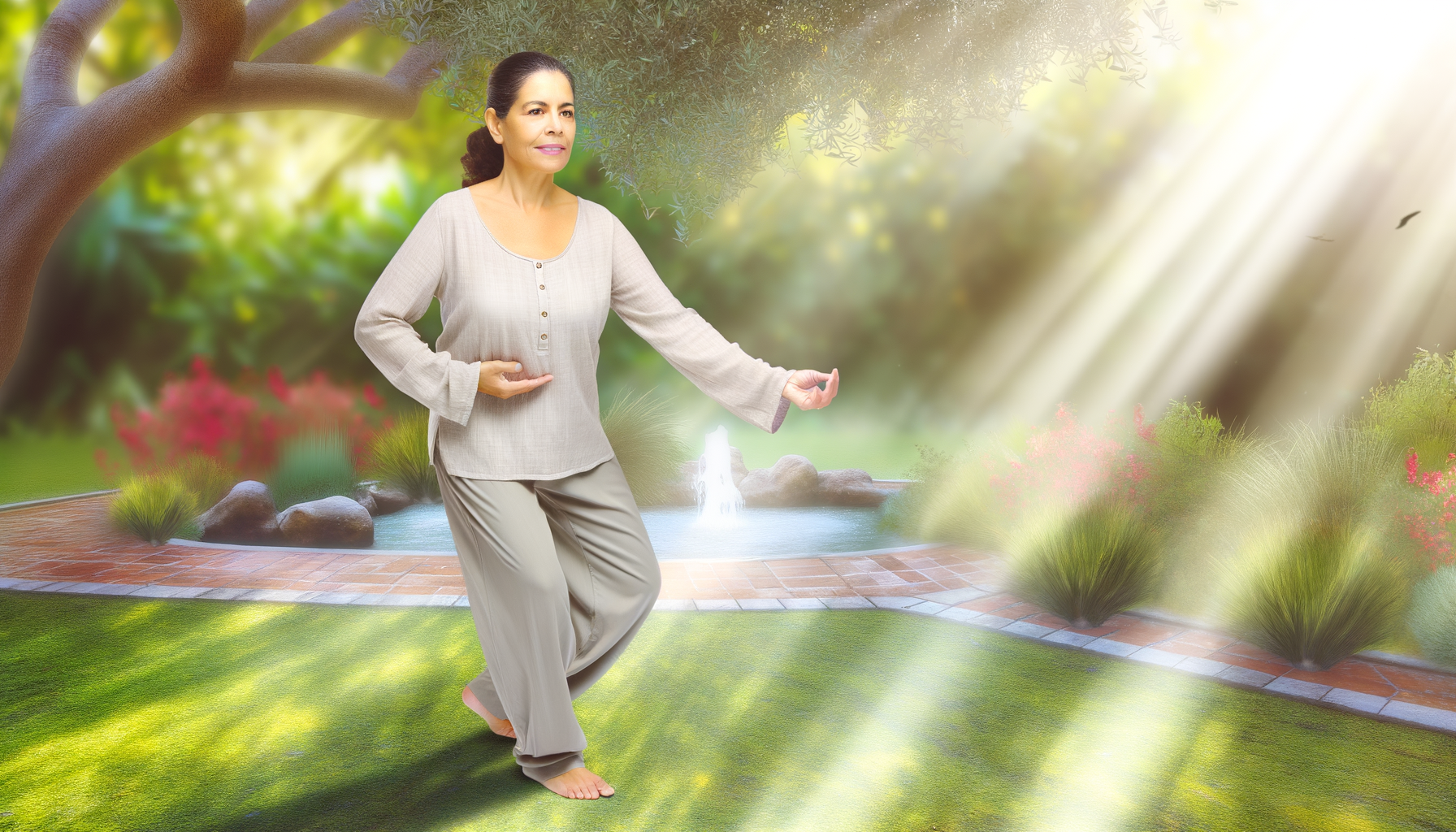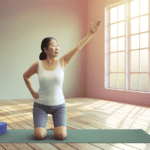Tai Chi: Origins and Principles
Tai Chi, also known as Tai Chi Chuan, is a traditional Chinese martial art that has evolved over centuries into a form of exercise combining slow, deliberate movements, meditation, and deep breathing. The origins of Tai Chi can be traced back to ancient China, where it was developed for both its self-defense techniques and its health benefits. The core principles of Tai Chi include the cultivation of qi (life energy), the practice of jin (softness), neigong (internal skills), and waigong (external skills), all of which aim to harmonize the body and mind.
Overview of Menopause: Symptoms and Age Range
Menopause marks the end of a woman’s reproductive years, typically occurring between the ages of 45 and 55. This natural biological process is characterized by the cessation of menstruation and a decline in the production of hormones such as estrogen and progesterone. Symptoms vary widely among women but can include hot flashes, night sweats, mood swings, sleep disturbances, and decreased bone density. The experience of menopause can significantly impact a woman’s quality of life, making the search for effective management strategies essential.
The Connection Between Tai Chi and Menopause Relief
Recent studies have begun to explore the potential of Tai Chi as a non-pharmacological intervention for relieving menopausal symptoms. The gentle, flowing movements of Tai Chi are thought to support the body’s natural balance, which can be disrupted during menopause. The meditative aspect of Tai Chi helps to manage stress and improve mental well-being, which may alleviate mood swings and sleep issues. Additionally, the weight-bearing nature of Tai Chi exercises can contribute to maintaining and enhancing bone density, addressing concerns about osteoporosis associated with menopause. With its holistic approach to health, Tai Chi offers a promising complementary therapy for managing the multifaceted symptoms of menopause.
Physical Symptoms of Menopause and Tai Chi Benefits
Combatting Hot Flashes and Night Sweats with Tai Chi
Hot flashes and night sweats are among the most common and disruptive symptoms experienced during menopause. Tai Chi, a gentle form of martial arts, has been shown to help manage these symptoms effectively. The slow, flowing movements of Tai Chi, combined with deep breathing and relaxation techniques, can help regulate the body’s temperature control system. Regular practice can lead to a reduction in the frequency and severity of hot flashes and night sweats, providing much-needed relief for menopausal women.
Tai Chi’s Role in Improving Sleep Quality
Poor sleep quality is another challenge faced by menopausal women, often exacerbated by other symptoms like night sweats. Tai Chi’s meditative movements promote relaxation and stress reduction, which can improve sleep patterns. Studies have demonstrated that women who engage in Tai Chi experience improvements in both sleep duration and quality. The calming effect of Tai Chi practice before bedtime can help in establishing a healthier sleep routine.
Enhancing Bone Density Through Tai Chi Practices
Menopause can lead to a decrease in bone density, increasing the risk of osteoporosis. Tai Chi, being a weight-bearing exercise, can help in maintaining and even enhancing bone density. The slow, controlled movements put a gentle stress on the bones, which stimulates bone growth and strength. This low-impact exercise is safe for those who may already have reduced bone density, making it an ideal practice for menopausal women concerned about their bone health.
Tai Chi’s Impact on Balance and Fall Prevention
As estrogen levels drop during menopause, women may experience a decline in muscle strength and balance, increasing the risk of falls. Tai Chi improves balance and muscular strength through its focus on body awareness and stability. The practice involves a series of weight-shifting exercises that enhance proprioception, which is the body’s ability to sense its position in space. By improving balance, Tai Chi reduces the risk of falls, which is particularly beneficial for menopausal women.
In conclusion, Tai Chi offers a holistic approach to managing the physical symptoms of menopause. Its benefits extend beyond mere symptom relief, contributing to an overall sense of well-being and improved quality of life during this transitional period.
Emotional Well-being During Menopause
Reducing Anxiety and Depression with Mindful Movement
Menopause can be a turbulent time emotionally, with many women experiencing heightened levels of anxiety and depression. Tai Chi, a form of exercise known for its slow and graceful movements, can be a powerful tool in managing these emotional challenges. The mindful movement practiced in Tai Chi encourages a focus on the present moment and bodily sensations, which can help divert attention from the cyclic patterns of anxious or depressive thoughts. The gentle physical activity increases the production of mood-regulating neurotransmitters, such as serotonin and endorphins, providing a natural boost to one’s emotional state.
Tai Chi as a Form of Meditation for Stress Relief
Stress is a common trigger for menopausal symptoms, exacerbating both physical and emotional discomfort. Tai Chi, often described as “meditation in motion,” offers a meditative experience that can significantly reduce stress levels. The rhythmic breathing and concentrated movements promote a state of calm and relaxation. This meditative aspect of Tai Chi helps to lower cortisol levels, the body’s stress hormone, and enhances the relaxation response in the nervous system. As a result, women practicing Tai Chi may find a sense of tranquility and reduced stress during menopause.
The Overall Mental Health Benefits of Tai Chi
The benefits of Tai Chi extend beyond the immediate relief of stress and mood symptoms. Regular practice has been associated with long-term improvements in mental health. The discipline required for Tai Chi can improve cognitive function, including better concentration and a sharper memory, which are often compromised during menopause due to hormonal changes. Additionally, the social aspect of participating in Tai Chi classes can combat feelings of isolation by fostering a sense of community and belonging, further contributing to overall emotional well-being.
In conclusion, Tai Chi offers a holistic approach to managing menopause symptoms, with particular benefits for emotional well-being. Its combination of mindful movement, meditative practice, and community engagement makes it an ideal exercise for women seeking natural ways to navigate the emotional rollercoaster of menopause.
Scientific Evidence Supporting Tai Chi for Menopause
Review of Studies on Tai Chi’s Effectiveness for Hot Flashes
Hot flashes and night sweats are hallmark symptoms of menopause, causing significant discomfort and impacting the quality of life for many women. Tai Chi, with its gentle movements and stress-reducing effects, has been studied as a potential remedy for these vasomotor symptoms. A systematic review of the literature reveals that while research is still emerging, there is promising evidence to suggest that Tai Chi may help alleviate hot flashes. The mechanisms are not fully understood, but it is hypothesized that Tai Chi’s ability to regulate the autonomic nervous system and promote relaxation may play a role in reducing the frequency and severity of hot flashes.
Research on Sleep Improvement and Tai Chi
Sleep disturbances are common during menopause, with many women experiencing insomnia or disrupted sleep patterns. A study published in the Journal of Mid-life Health investigated the impact of an 8-week Tai Chi exercise program on sleep quality among postmenopausal working women. The results indicated a significant improvement in sleep quality, as measured by the Sleep Quality Scale (SQS), following the Tai Chi intervention. The study suggests that Tai Chi, as a low-impact, mind-body exercise, can be a safe and effective way to improve sleep in postmenopausal women.
Evidence of Tai Chi’s Benefits for Bone Density and Balance
Menopause is associated with a decline in bone density, increasing the risk of osteoporosis and fractures. Additionally, changes in balance and muscle strength can lead to a higher incidence of falls. Tai Chi has been evaluated for its potential to enhance bone density and improve balance. The controlled, weight-bearing movements inherent in Tai Chi practice are thought to stimulate bone growth and strength. Moreover, Tai Chi’s emphasis on balance, coordination, and flexibility can contribute to fall prevention. Studies have shown that regular Tai Chi practice leads to improvements in measures of balance and physical performance, which may indirectly suggest a positive effect on bone health.
In conclusion, the scientific evidence supports the incorporation of Tai Chi as a complementary approach to managing menopause symptoms. Its benefits in reducing hot flashes, improving sleep quality, and enhancing bone density and balance make it a valuable component of a holistic menopause management plan. However, further research is warranted to fully understand the scope of Tai Chi’s effectiveness and to optimize its application for menopausal symptom relief.

From unhappy, dry, and sandpaper to silky, smooth and feeling good. That’s Cleo. Cleo is a 100% natural labial balm to moisture and soothe “your other lips”. Cleo is chemical-free, water-free, pH optimized and helps maintain and restore your delicate labial skin’s natural flora. Ideal for daily use or as needed. Get the most silky, lovable lips ever.
Practical Considerations for Tai Chi Practice
Choosing the Right Tai Chi Style for Menopause Symptoms
When selecting a Tai Chi style to manage menopause symptoms, it’s essential to consider the individual’s physical capabilities, preferences, and specific menopausal challenges. Different styles of Tai Chi, such as Yang, Wu, Chen, and Sun, offer varying paces and complexity of movements. For instance, the Yang style is characterized by slow, gentle, and expansive movements, making it suitable for beginners and those experiencing joint discomfort. On the other hand, the Chen style involves more dynamic movements and may be more appropriate for individuals seeking a more vigorous practice. It is recommended that women explore different styles under the guidance of a qualified instructor to find the one that resonates best with their needs.
Frequency and Duration of Tai Chi Sessions
The frequency and duration of Tai Chi sessions can significantly influence the effectiveness of the practice in alleviating menopause symptoms. Research suggests that engaging in Tai Chi for at least 30 to 60 minutes per session, two to three times per week, can lead to noticeable improvements in sleep quality, physical performance, and quality of life. Consistency is key; therefore, establishing a regular practice schedule that fits into one’s lifestyle is crucial for sustained benefits. As proficiency grows, individuals may increase the duration or frequency of sessions to enhance their experience.
Incorporating Tai Chi into a Holistic Menopause Management Plan
Tai Chi should be considered a complementary component of a broader menopause management strategy. This strategy may include dietary modifications, stress reduction techniques, and other forms of exercise, such as cardiovascular and strength training activities. Women are encouraged to consult with healthcare professionals to create a comprehensive plan that addresses their unique symptoms and overall health goals. By integrating Tai Chi into this plan, individuals can take a proactive and holistic approach to managing the physical and emotional changes associated with menopause.
Summary: Tai Chi offers a gentle yet effective way to manage menopause symptoms. Selecting the appropriate style and maintaining a consistent practice schedule are vital for reaping the maximum benefits. Incorporating Tai Chi into a holistic approach to menopause management can lead to improved physical and emotional well-being during this transitional phase of life.
Tai Chi Beyond Menopause: Long-term Health Benefits
Cardiovascular Health and Tai Chi
The practice of Tai Chi has been linked to a variety of long-term health benefits, particularly in the realm of cardiovascular health. This gentle form of exercise is known for its slow, flowing movements that can significantly improve heart health. Studies have shown that Tai Chi can help reduce blood pressure, improve lipid profiles, and enhance overall heart function. The meditative aspect of Tai Chi, with its emphasis on deep breathing and mental focus, contributes to stress reduction, which is a key factor in maintaining a healthy cardiovascular system. Regular Tai Chi practice can lead to a decrease in the risk of heart disease and stroke, making it a valuable exercise for sustaining heart health well into the later years of life.
Muscle Strength, Flexibility, and Tai Chi
As we age, maintaining muscle strength and flexibility becomes increasingly important to preserve mobility and reduce the risk of injury. Tai Chi is an effective way to enhance both of these physical attributes without the stress of high-impact exercises. The slow, controlled movements involved in Tai Chi require the engagement of various muscle groups, leading to improved muscle tone and strength over time. Additionally, the emphasis on range of motion and fluid movements helps to increase flexibility and joint health. This combination of strength and flexibility contributes to better posture, reduced pain, and a greater ability to perform daily activities with ease.
Tai Chi for Lifelong Mental Well-being
The benefits of Tai Chi extend beyond the physical body, offering profound effects on mental well-being. The practice encourages mindfulness and present-moment awareness, which can lead to reduced levels of anxiety and depression. The meditative components of Tai Chi, such as focused breathing and visualization, promote relaxation and mental clarity. As a result, practitioners often report improved sleep quality and a greater sense of peace. The social aspect of group Tai Chi classes also provides a sense of community and support, which is vital for emotional health. By integrating Tai Chi into one’s lifestyle, individuals can enjoy enhanced mental well-being and resilience against the stresses of life.
Tai Chi offers a multitude of long-term health benefits that extend well beyond the management of menopause symptoms. Its positive impact on cardiovascular health, muscle strength, flexibility, and mental well-being makes it an ideal practice for individuals seeking a holistic approach to health maintenance. As a low-impact exercise, it is accessible to people of all ages and fitness levels, providing a sustainable way to improve quality of life and promote healthy aging.

Conclusion and Recommendations
Summarizing the Role of Tai Chi in Managing Menopause Symptoms
Tai Chi, an ancient Chinese martial art, has emerged as a beneficial practice for managing various symptoms associated with menopause. This gentle form of exercise combines slow, deliberate movements with deep breathing and meditation, creating a holistic approach to well-being. The evidence presented in this article underscores the effectiveness of Tai Chi in alleviating physical symptoms commonly experienced during menopause, such as hot flashes, night sweats, and sleep disturbances. Moreover, Tai Chi’s emphasis on mindful movement and balance can enhance bone density and reduce the risk of falls, which are of particular concern during the postmenopausal period.
Emotionally, Tai Chi serves as a meditative practice that can help reduce anxiety, depression, and stress, contributing to an overall sense of mental health and well-being. The scientific studies reviewed provide substantial support for the role of Tai Chi in improving both the physical and emotional symptoms of menopause, making it a valuable component of a holistic menopause management plan.
Consulting Healthcare Providers Before Beginning Tai Chi
Before embarking on a Tai Chi program, it is crucial for individuals to consult with healthcare providers. This ensures that the exercise is appropriate for their specific health conditions and that it complements any existing treatments. Healthcare professionals can provide guidance on the most suitable Tai Chi styles and tailor the frequency and duration of sessions to optimize benefits while minimizing any potential risks.
Encouraging Further Research and Personal Stories
While the current body of research offers promising insights into the benefits of Tai Chi for menopause symptoms, further studies are necessary to deepen our understanding of its full potential. Large-scale, randomized controlled trials with diverse populations could provide more definitive evidence of Tai Chi’s efficacy across various menopausal symptoms. Additionally, personal stories and qualitative research can offer valuable perspectives on the individual experiences of menopausal women practicing Tai Chi, contributing to a more comprehensive view of its impact on quality of life.
In conclusion, Tai Chi presents a low-impact, accessible form of exercise that can significantly improve the quality of life for women experiencing menopause symptoms. By incorporating Tai Chi into their lifestyle, women can navigate the menopausal transition with greater ease and comfort. Healthcare providers should consider recommending Tai Chi as part of a comprehensive approach to menopause management, and ongoing research should continue to explore its multifaceted benefits.












